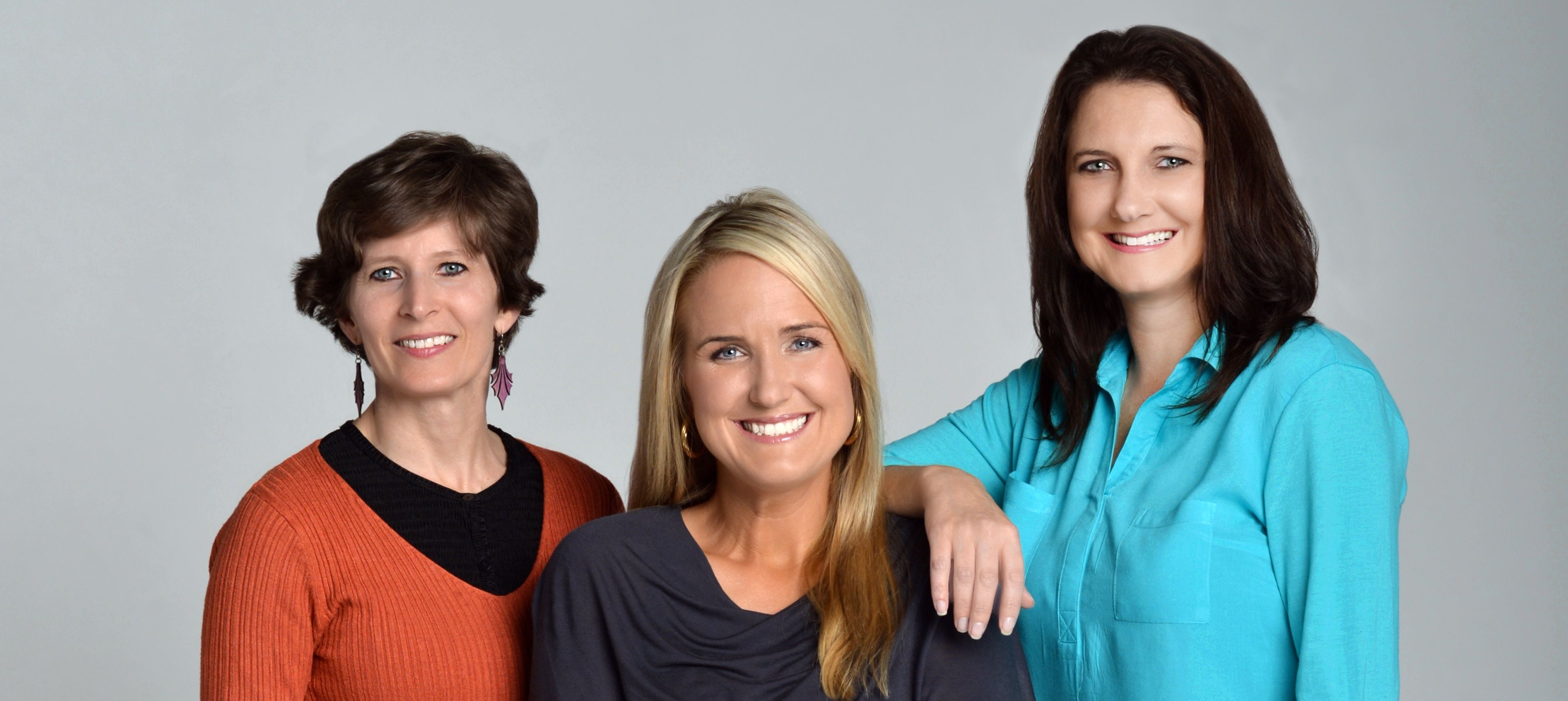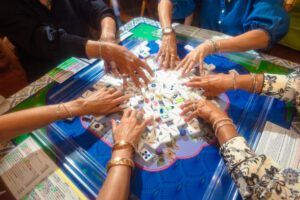Seeking the silver lining
Women in midlife, with careers and children, strive to surmount the effects of multiple sclerosis
No one plans to have a disease. Especially not in mid-life, when days are fast paced and obligations are significant. That’s why the three local women whose stories follow are so remarkable. They are learning to live with multiple sclerosis while encouraging others around them. Read on to be inspired.Last February, a jagged wind might have been blowing across Joanna Haynes’ lawn on her 40th birthday, over the wide porch with its pale blue awning, stirring the branches of the oaks as they primed their leaves to drop.
A stitched soccer ball might have volleyed against the toes of her older son, 10-year-old Blue, as he practiced taking a shot.
A brave winter butterfly—abundant in Louisiana—might have flickered its dappled, golden wings and relished a day without ice. Her son, Jackson, now 5, might have tried to catch it.
Joanna wouldn’t know. She was in bed. And it felt like she might never get up.
A few weeks earlier, at the gym, Joanna had trouble walking back to her car after a stint on the exercise bike. Her mobility steadily decreased in the days that followed. She spent the better part of the winter lying down.
“I told my husband, ‘Get paper. I have to write letters to my kids. I’m going to die,’ ” Joanna recalls.
Joanna learned in February, soon after her birthday, that she was suffering from multiple sclerosis, commonly referred to as MS.
“It was a humbling experience,” says her husband, John, an artist, filmmaker and also Joanna’s business partner. “Joanna and I have known each other since we were 12. I’ve seen her when she was a young girl and now as a woman. And she is such a warrior, which is one of the reasons I was so attracted to her.”
Even as her physical coordination faltered and eyesight strained at basic tasks, that fighting spirit John saw in his wife rose up. Starting with tiny exercises, Haynes learned to walk again over the next four months. She changed her diet and took necessary supplements. Her mobility improved and her health improved.
“Then the grieving started,” Joanna says. “You don’t have to have a physical death to grieve. My life as I knew it was over in a flash.”
MS occurs when the body’s immune system begins to eat away at the myelin sheath that protects nerves. Myelin is a fatty protein that acts like the plastic casing on electrical wiring. When the myelin is gone, interference between the brain, spinal cord and body occurs.
Many who have MS are mothers with careers, like Joanna.
At a time when women are already doing complex maneuvers to get to work, get dinner on the table, get kids to school and to practices, MS often knocks the whole arrangement to the floor.
During the two years before Joanna was diagnosed, she and John worked intensely through their company Wish Picture Shows to produce and release the movie Ole War Skule, a behind-the-scenes film showcasing the Saturday night experience in Tiger Stadium. Joanna was also nursing her mom, who was dying from a mitochondrial disease—a disease Joanna inherited that actually compounds the symptoms of her MS.
Even under great pressure, she worked to be tough. Until MS brought her to her knees.
“People were always ‘atta boy’ with me and my achievements,” Joanna says. “That was my nature. To pile it on, go with it, encourage others to follow their dreams. I don’t do needy. That was not very attractive to me, to be needy, to be dependent.”
For the months that she was homebound, Joanna’s friends pitched in, making meals and cleaning her house. But that generosity was difficult to accept for a woman who had an innate ability to tend to others, not the other way around.
“I was always the one where, if I had people in my home, I had a candle burning. The pillows were fluffed,” Joanna says. “But now they are coming and the dog is shedding. They are folding my husband’s underwear.”
The heroic act of piecing together a new existence can be overwhelming for those living with MS. And there’s the constant possibility of a relapse, since MS symptoms tend to flare up on occasion.
“Finding that balance is something we are still looking for,” John says. “No one really has the ‘Hey, you have a headache, pop a pill and your headache will go away in 20 to 30 minutes’ solution.”
But Joanna has found a silver lining. MS has presented her with opportunities she never would have taken advantage of before the onset of the disease. She has slowed down. She is journaling and finding delight in a less frantic-paced life, one where she is able to stop and chat with a friend she sees at the grocery store instead of waving and saying, “I gotta run.”
She’s cooking fresh veggies instead of always grabbing takeout. She’s appreciating the view from the living room window, and the ease of the porch when the whole family gathers there laughing together. She’s reading a book to her children instead of keeping them otherwise occupied so she can finish a task.
“There is a purpose to every life challenge,” Joanna says. “My goal is to be an example of how God shows up.”
Kathy Grenfell still dreams it: She is running around the LSU lakes. It’s one of those gorgeous, tall-sky days that stretch, cobalt and glittering, all the way to sundown. Opening her eyes, then, the dream is gone. She realizes that she doesn’t feel right even calling herself a runner anymore.
“That was before,” she says. “There is sort of ‘Before MS’ and ‘After MS.’ ”
Grenfell was training for her 12th marathon when she was diagnosed with MS in 2005.
During runs, she had noticed that her foot scuffed every few hundred steps. Then her eye began to twitch and her vision became distorted. After her initial diagnosis, she drove to Houston to get a second opinion. MS was confirmed.
It’s been eight years. Yet each day, when she drives by the LSU lakes, she still feels a pang.
Kathy had been a runner most of her life, first as a sprinter at Baton Rouge High. Then, in the years after college, as a long-distance runner.
She would train at lunch, taking breaks from work as a pharmacist. When she was pregnant with each of her three sons—Ty, 11, Brady, 16, and Grant, 19—she jogged until two weeks before the babies were due, meeting the worried glances of neighbors with a healthy grin.
She knew nothing other than to be the athletic supermom, looking forward deeply to jogging alongside her kids when they started participating in long-distance events.
MS changed everything.
“You don’t want to complain. You’re here,” Kathy says. “But what you wanted to accomplish isn’t here anymore.”
To cope, athletic, petite Kathy has poured herself into finding new ways to define her life, still actively participating in the swimming careers of her three talented sons.
She makes it a point to work out as often as she can, though that’s usually in the gym. Also, following a period of study and training, she has become a swimming official with Tiger Aquatics, the club where her sons have trained.
Kathy has been surprised at how her friends and family have cheered her on and lent a hand when it comes to her limitations. “I generally don’t want people to coddle me,” she says. But she has learned to ask for help instead of staying isolated. For example, if she needs to go to a swim meet in a distant city, her parents drive her there.
“I can fall asleep at a red light,” she says.
She decided to quit working after the MS diagnosis. That stung because it meant her husband, John, had to work more. But she is philosophical about the ensuing changes in their lives
MS is better if you take things as they come, she notes. “For everyone it’s so different. Don’t make yourself think that there is a certain process that will happen. Do what you can do. None of us knows what can happen a year from now, so be positive.”
It meant a lot to Kathy to be a powerful athletic role model for her boys. She struggles daily with the question of whether she can inspire them when she can’t, say, train with them for a marathon.
But strength isn’t only a reflection of what you are able to do. It’s often more about how you choose to face the things that charge at you.
“It’s so, so impressive to me that she does what she does on a daily basis, because what she deals with while doing tasks that most would consider trivial is incomprehensible,” says son Grant. “Not only does she deal with it, but she succeeds and does way, way more than she should or needs to. Yet she seeks out no one’s help, reassurance or sympathy. She’s one of the toughest people I’ll ever know.”
Heather Andricain knows loss. She was diagnosed with MS three years ago, right after losing custody of a toddler she and her husband, Juan, had parented since birth.
The duo had adopted a baby girl they named Abigail while living in Hilton Head, S.C. Nineteen months and a long legal battle later, though, the state of South Carolina granted Abigail’s birth mother custody.
“When she left me, she was the happiest baby in the world,” Heather says, her eyes brimming with tears. The custody battle was brutal, and losing this child brought with it a wrenching, physical pain she still feels each day, though she covers that anguish with a generous smile.
Heather and Juan left Hilton Head because they never wanted to accidentally run into the little girl their hearts had claimed. Heather prayed for strength.
“I have to believe that God has a way. A family was back together. I had amazing peace about it, and I know that family is taking care of her. They fought for her, and they loved her.”
The Andricains moved to Baton Rouge, Juan’s hometown. Heather joined a Bible study group at Istrouma Baptist Church and started meeting new friends and getting her life back in order.
Then one day, she woke up and the room appeared sideways. One leg started giving her trouble. Over the course of a weekend, she needed a cane to walk.
An MRI confirmed that she had MS.
“It was very scary for me,” says Juan, a campaign manager at Capital Area United Way. “I just remember fast-forwarding in my head: What is our life going to look like? What is this going to mean? Am I going to have to care for her long-term?”
One of the most frustrating things about MS is its capricious nature. Experiencing it, some experts say, is like a group of blindfolded people feeling the different parts of an elephant and trying to describe the animal by touch. While one patient might need a cane, another is having trouble seeing straight. Still another has bladder issues. Yet another struggles with multitasking and staying organized. But new breakthroughs in medication have made it so that fewer people with MS become severely handicapped.
Heather says that once she started medication, her walking improved. Still, she has had to learn to manage occasional bouts of depression and a constant, low-level exhaustion that is common with MS.
Friends and family moved quickly to be a scaffolding for the Andricains. Members of the Bible study group at Istrouma came and cleaned their house after Heather was diagnosed, just to remind her they’d be there for her. She found that working part-time is best for her, and she found a supportive boss at Plus One Design & Construction.
Baton Rouge neurologist April Erwin says the No. 1 challenge for MS families—and MS does impact every member of a family—is learning when to slow down and when to pursue meaningful work and life choices.
“We have to encourage our patients to figure out where those boundary lines are,” says Erwin. “How can we optimize that? How can we stretch those limits and not go beyond them so that they aren’t just totally wiped out?”
Still eager to become parents, the Andricains decided to apply to become foster parents. To their delight, Heather’s MS was not a limiting factor in their being selected to house two rambunctious boys, ages 4 and 7.
“One thing we have learned is that if we are doing what God asks us to do, he’ll work it out for us,” says Juan. “That’s just the way it always works for us.”
Heather believes that the foster children have saved her in many ways. Children don’t need a perfect parent, just one who loves them purely.
“It gives you a purpose. You move because you have children to take care of,” says Heather. “And because they are in foster care, I want everything to be about them, all the time. I never want my problem to become theirs.”
Still in the first year following her diagnosis, Joanna Haynes is coming to accept for herself that limited ability does not overshadow a life filled with love.
She recognized this fact earlier, while she was tending to her own mother, who died far too young. Her son also made the connection when he crawled into bed with her one Sunday because she didn’t have the strength to rise and take him to soccer practice.
Joanna recalls,”Blue said, ‘Mom, last week I got a conduct mark at school, and you gave me grace. I need to give you grace today.’ ”
A key part of dealing with MS for Joanna has been gaining comfort in not being afraid of whatever happens—and teaching her kids that illness and death are not things to fear. At the same time, she’s meeting the challenges with a diet free of artificial ingredients and sugar, plenty of supplements, a keen researcher’s mind and a bring-it-on attitude.
“I’ve told all of my doctors I want to be their poster child. I will fight harder than anyone else,” she says. “Whatever it takes to show my children that you don’t go in a corner to die.”












